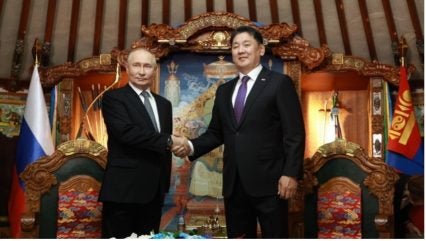
An agreement for the construction of a low-power NPP (ASMM – Atomnoi Stantsii Maloi Moshnosti) near New Karakorum may be signed in the first half of 2025, Russian Ambassador to Mongolia Alexey Evsikov told Izvestia. The two sides are also discussing projects using peaceful nuclear energy for power generation, medical purposes, agriculture and other fields, the diplomatic mission added.
During the September visit of Russian President Vladimir Putin to Mongolia, an understanding was reached on the expediency of siting a ASMM in a suitable area near New Karakorum, Mongolia’s new capital, which is to be built 400 km southwest of Ulaanbaatar over the next 20-30 years. The planned capacity of the NPP will be up to 330 MW, Evsikov said. “The parties agreed to draft an appropriate intergovernmental agreement. We hope that we will be able to sign it in the first half of next year,” he told Izvestia.
Rosatom noted in September that the technical aspects of the NPP project was practically approved. However, the parties still need to assess the site, find sources of funding, agree on a number of technical conditions and begin training local specialists.
“We hope that the project will be the beginning of active Russian-Mongolian cooperation in the field of peaceful nuclear energy, and will also lay the foundation for a new modern technological sector of the economy for Mongolia,” Evsikov said.
Meanwhile, nuclear co-operation is being strengthened. For example, in June 2024, Rosatom opened an office in Ulaanbaatar. The corporation cooperates with its Mongolian partner Mon-Atom to develop projects using nuclear energy for medical purposes, agriculture and other fields.
“Ulaanbaatar is striving to combine the new wave of industrialisation with a reduction in atmospheric pollution, focusing not only on modernisation of coal-fired power generation, but also on the use of “clean” energy sources,” the ambassador said. “In both areas, Russian companies offer their experience and services.”
He added: “Of course, nuclear energy plays an important role in energy security. We see that the countries of Central Asia are also interested in this. For example, Kazakhstan held a referendum on the construction of a NPP. Mongolia has certain natural resources, in particular, uranium, but it does not have its own facilities for using these resources, so joint small modular reactors are under consideration and cooperation is underway on this track.”






